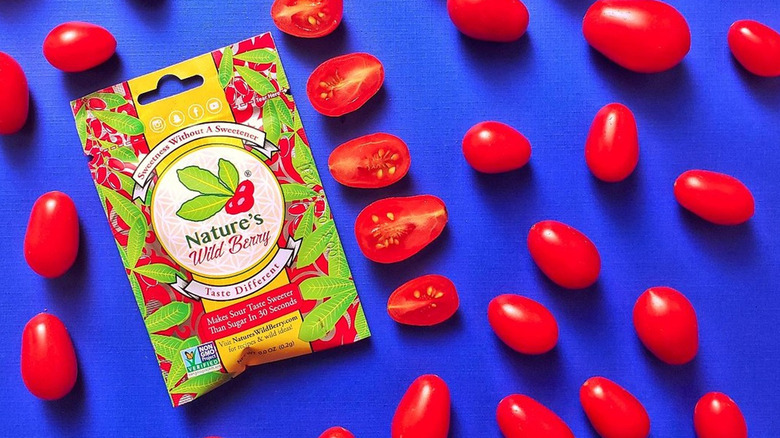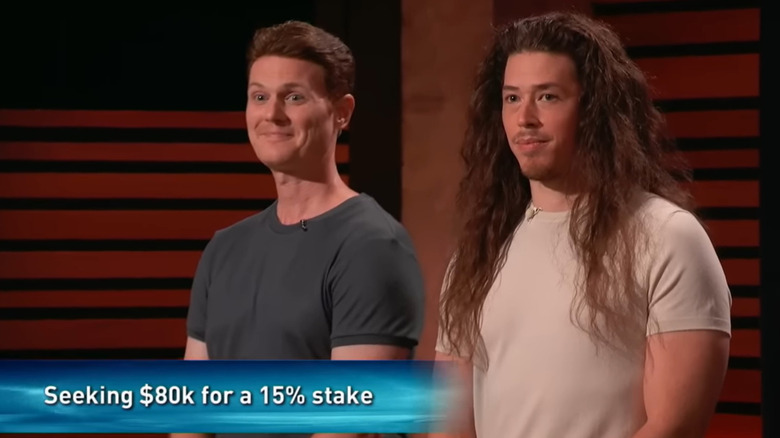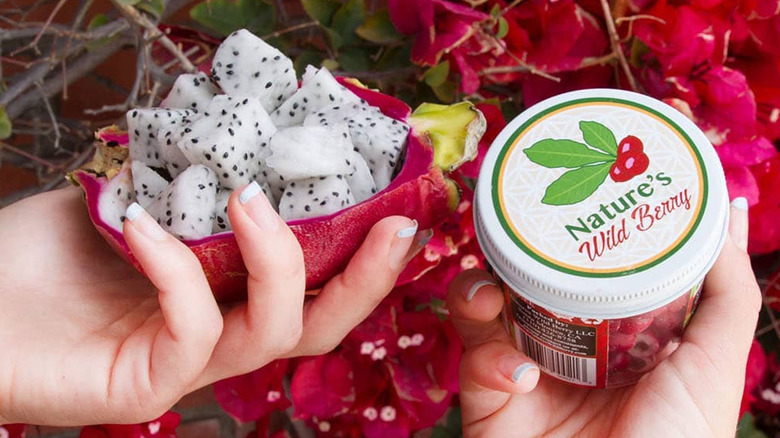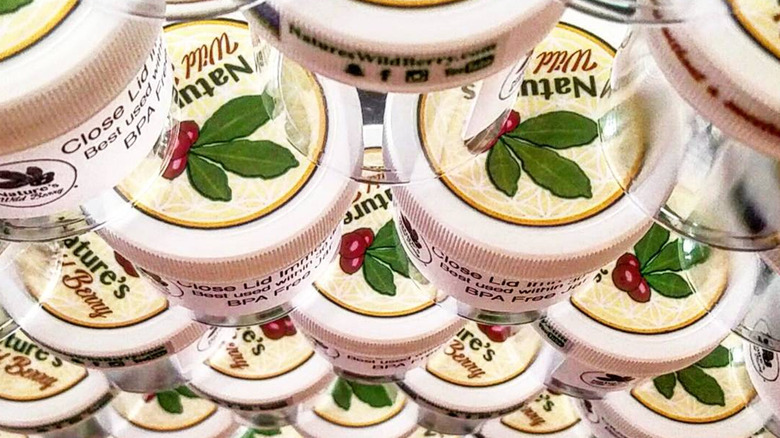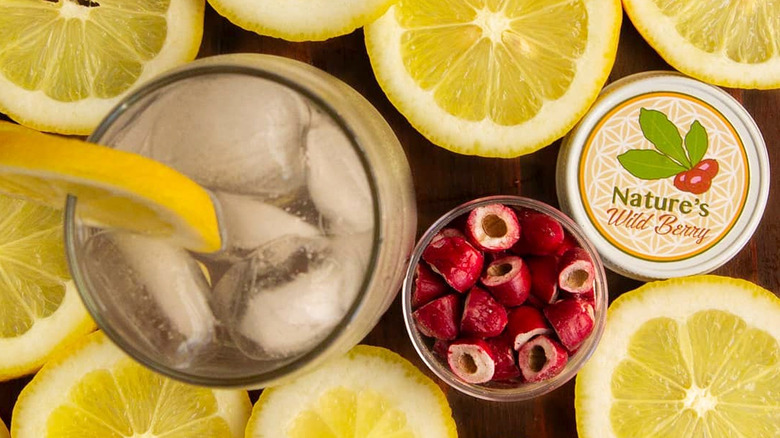Nature's Wild Berry: Here's What Happened After Shark Tank
We may receive a commission on purchases made from links.
Friends and business partners Hank Watt and Juliano Bonanni brought their miracle berry product, Nature's Wild Berry, before the "Shark Tank" investors for a chance at funding. The duo appeared in Season 14, Episode 21, which first aired on May 5th, 2023, and four of the five Sharks took the bait.
Nature's Wild Berry, which makes sour flavors taste sweet, came to fruition due to co-founder Hank Watt's health crisis. In 2013, he was overweight, pre-diabetic, and addicted to sugar. At the time, his chef friend Juliano had been experimenting in his restaurant with miracle berries. While Juliano had been whipping up green juices to assist Hank's weight loss goals, Hank struggled with the bitter flavors of the juice, craving sweetness. Juliano tried adding the flavor-changing berries to Hank's beverages, which transformed them into something sweet and delicious. Hank went from hating the juice to drinking a liter of it daily, and he ascribes this to his 80-pound weight loss. Convinced of the miracle berry's ability to help others like it helped Hank, the pair launched their business in 2016.
The trick behind the miracle berry is glycoprotein, which affects your tongue's taste buds and changes acidic, sour, or tart flavors to sweet. The company markets it as a healthy way to replace sugar, control weight, and type 2 diabetes. The company recommends its product for people undergoing chemotherapy, which can cause a metallic taste in the mouth that may be improved by the berries.
What happened to Nature's Wild Berry on Shark Tank?
To open their pitch on "Shark Tank," Juliano provided company info as Hank sucked on a lemon, proclaiming that it tasted like candy. They explained that their product blocks sour tastes and makes them sweet. Juliano demonstrated further by drinking apple cider vinegar, which he said tasted like apple juice. The sharks were given lemons, pickles, and cranberry juice, and were instructed first to chew the berries, then taste the foods. Lori Greiner thought it was "crazy" that berries could make her pickle taste like candy, while Barbara Corcoran was convinced it was a wacky "parlor trick."
The company had been funded out of pocket, with Hank using his $120,000 savings and $20,000 provided by Juliano. Projected sales for that year were $34,000 with a $50,000 profit. They asked the investors for $80,000 with a 15% stake.
Kevin O'Leary offered $80,000 for a 33% stake plus a $5 royalty per unit until his money doubled. Daymond John was the next Shark to dive in with an offer of $80,000, a lower 30% claim and no royalties. Kevin countered with $80,000 and royalties but only 20% in equity. Lori made a bigger splash by offering the same but taking only $3 royalties. Mark Cuban then jumped in to team up with another shark, to which Lori suggested the same offer split between them. Before Mark could even agree, Hank shouted that they had a deal.
Nature's Wild Berry after Shark Tank
Things looked great for the brand after its episode of "Shark Tank" aired. Amazon sales data revealed an immediate 40% sales bump thanks to the show, although, just as quickly, all the company's stock was sold-out, caught unprepared for the sales surge (via EcomCrew). Since then, an undated update on Nature's Wild Berry website announced that all items are back in stock. The miracle berries are available to purchase on Amazon or directly from the company's website.
After the filming of the Nature's Wild Berry episode, Lori Greiner posted a TikTok of her and Mark Cuban sharing the miracle berries that they co-invested in, which she says were psychedelic and blew their minds. The clip has over 107,000 likes. We did notice, however, that in the video, Lori and Mark are in the same outfits worn in the episode, and the background sets look the same, so her video was likely filmed at the same time as the show. Mark Cuban's portfolio, which usually shows all of his Shark Tank investments, has not yet been updated to include Nature's Wild Berry.
As of July 2023, Nature's Wild Berry has a significant social media following on TikTok, with 68.9K followers and 17.1K on Instagram. It also has 1,000 followers on Facebook and a modest 420 subscribers on YouTube. None of the brand's social channels have been updated in the months since the "Shark Tank" episode.
Is Nature's Wild Berry still in business?
While the brand's social media presence has been keeping a low profile, the company still appears to be in business. With the back-in-stock notice on its website, and products available to purchase again on Amazon, the gears still seem to be turning.
Soon after the "Shark Tank" episode aired, Nature's Wild Berry added a Shark Tank Special to its product line for a limited time only. The special is a 50-serving bag of miracle berries, priced at $24.99. The berries are also sold in jars, from travel sized to small, medium, and large, ranging from $27.99 to $159.97. A single pack is available for $3.99, which includes two servings. The product line also includes Barely Bears, described as the fastest-acting and strongest miracle berry that can be purchased. Those cost $16.99 for a bag of 10.
Nature's Wild Berry has garnered at least one celebrity fan, as actress Jennifer Garner is seen in the pinned post on its Instagram page sampling miracle berries. The reel captures her amazement as she first eats some berries from their jar, then eats lemons and limes, excitedly sharing that they taste like lemonade.
What's next for Nature's Wild Berry?
With no public updates about the company's plans or status since the airing of "Shark Tank," time will tell how Nature's Wild Berry will do in the long run. There are similar products available to purchase by other manufacturers, although what sets Nature's Wild Berry apart is that the company owns its own farm and grows and processes its own berries using its own patented freeze-dry process, which preserves the berries at their peak freshness. While other miracle berry products for sale are often made with deceptive fillers and preservatives, Nature's Wild Berry does not contain any additives and is prepared in an allergen-free facility.
The novelty of miracle berries is not new. Originating in West Africa, they are also known as ledidi berries (Synsepalum dulcificum). A 2008 New York Times article about flavor-tripping popularized the activity, which is when you gather for parties with other foodies to sample the effects of the berries on different ingredients. The renowned chef Homaro Cantu, who died in 2015, was a proponent of the magical fruit, opening his Chicago restaurant Berrista specifically to highlight his miracle berry menu. He also wrote The Miracle Berry Diet Cookbook, featuring 150 recipes.
It remains to be seen if the "Shark Tank" funding of Nature's Wild Berry will bring about a resurgence in flavor-tripping or whether the company will continue to expand and innovate in the natural products and snack food markets.

